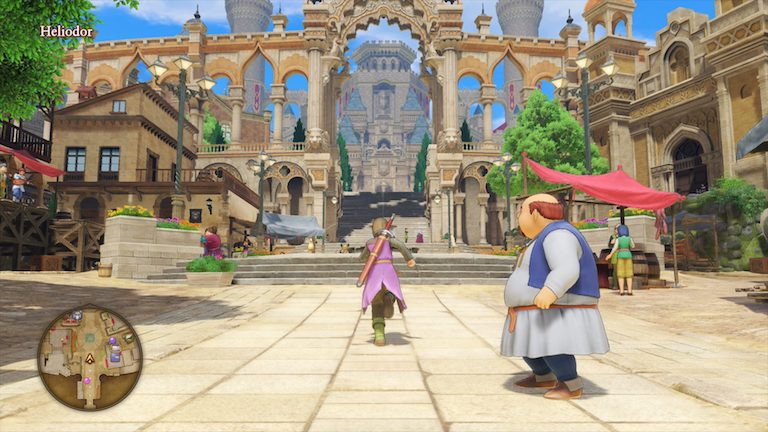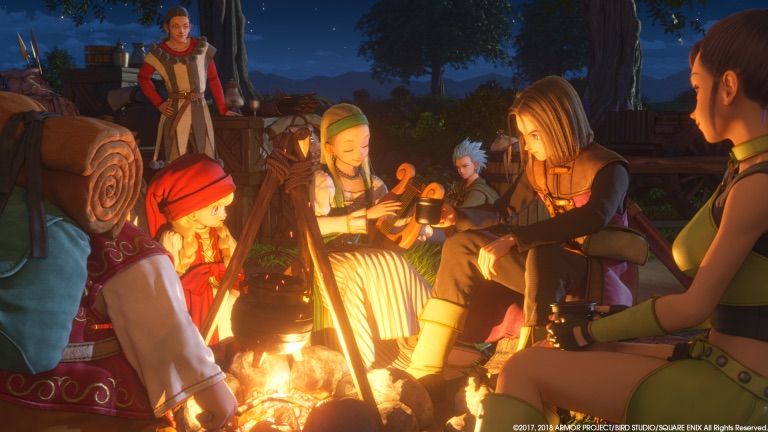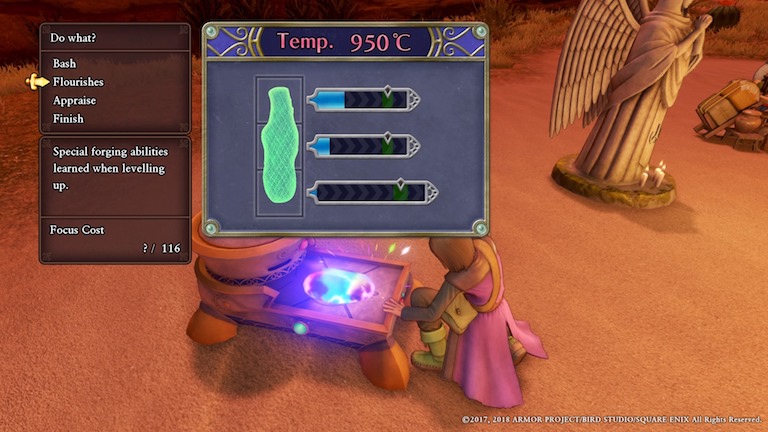
As a long-time fan of JRPGs, the Dragon Quest series has always seemed like something I would immediately take to, as a classic which has defined many elements of the genre. Despite this, I had never gotten around to making the time to actually play one, due to either other distracting games or pure laziness. With Square Enix releasing another in this line, namely “Dragon Quest XI: Echoes of an Elusive Age,” I figured it was about time I remedy this and see what makes this series so famous.
Dragon Quest XI follows the tale of a mysterious youth on a world-wide quest, meeting new companions along the way each with their own motivations to follow along. While this description is vague, I honestly can’t think of a better way to describe it without spoiling some nice discoveries along the way. From a bit of research into older Dragon Quest titles, it seems to be in line with the norm of the series: a grand adventure, with a continually shifting objective as you make your way through the story. In full, the tale is engaging, inspiring and filled with memorable moments.

Where the story is good, your party is a constant source of joy and entertainment. It’s not often I come across a complete active cast of which I could say liked each member equally, from the moment I met them until the closing scenes. Each one of them differs significantly in their opinions and behaviour, and watching them interact with one another can be equal parts hilarious and meaningful. Back this up with a very strong English voice-over, and you’ve got yourself a party you’ll not forget any time soon.
This would all be for naught if the world you were exploring with your exemplary teammates wasn’t worth exploring, but the designers have got this covered too. It’s not the largest JRPG world I’ve ever journeyed through, but there’s a wealth of good design to find within it. Each town has its own customs and language habits, and at least a little bit of wider-world lore to discover. I was delighted each time I came across a new town, eagerly getting tidbits of information out of the townsfolk while enjoying their own odd ways.

Tying all of the above together, you can’t look past the gorgeous detail put into every element. Cutscenes are absolutely beautiful, per the standard of the day. The world is diverse not only in culture but with a range of sights too, with more than a couple landscapes that are a treat for the eyes. The lively cast is given even more character by their diverse styles. Even the monster designs are intriguing and odd, such that a fun reward for finding a new zone is merely the discovery of new monsters.
Speaking of monsters, combat is one of the strongest elements in play here. It’s definitely a lot simpler than many I’ve played in the past – there’s no structured “weakness/strengths” system, nor any real bonus mechanics to combat. In place of complex systems, you’ve got a classic, tightly-balanced RPG experience, with a simple turn-based trading of blows, special moves and magic. The focus is often on being as efficient as possible: where many modern JRPGs will tend towards large numbers, your health and mana are usually quite low figures that can both drain quite rapidly in more intense combat.

While the above is shown to its full capacity in boss fights, it’s worth mentioning that other encounters are often not quite as exciting in the late game. Once you establish the best way to win against enemies of lower HP, you’ll find yourself doing the exact same things in every non-boss encounter. This is balanced by the fact that there are usually no random encounters so you can avoid fights if they’re getting too repetitive, but on the other hand, you’re rarely given an incentive to want to do additional battles especially when comparing the paltry experience-gain of normal monsters to the massive gain associated with boss encounters. In light of this, my late game was mostly characterised by frenzied monster encounter dodging.
The crafting system absolutely deserves a special mention here, as it’s the most fun I’ve had crafting equipment in a long time. As a mini-game, it’s ideal. It’s the perfect mix of risk and reward in that you can’t fail to craft the item entirely, but doing it correctly is well worth accomplishing. The activity is quick enough to never feel exhausting but still requires your attention to succeed. You’ve got a lot of control over the outcome, but there’s even a dose of luck in there to pull of an unexpected ‘Perfect’ out of a dismal start. I can’t stress enough how excited I was to get back to the crafting station after a long journey and get back to work at it.

I am also pleased to see that side quests have been implemented in my preferred method: tracked but unmarked. The quest log records only the little information that’s provided by the quest-giver, which you’ll need to use to find the objective of the quest. It’s often straightforward, but there were a few that had me stumped for a fair while. Perhaps the only type of quest I could have done without were the ones that tasked you with finding a specific NPC in a city, with no hint as to their potential location. Running around town talking with every person in sight a second time (and, in my case, invariably a third) was not the highest point in my playthrough.
The standalone negative elements are really only minor nicks in the strong package that’s been put together here. Item and equipment management is clunky, but you do get a feel for it by the end of the game. Outside that, the menu isn’t laid out intuitively (something bothers me about having two different options for party-healing at the top of the list that also contains character development and the quest log.) Loading times aren’t ideal, but this is only really a problem when you’ve got to face a few in quick succession.

As my first foray into the Dragon Quest series, I’m absolutely ecstatic at what I’ve found here. A gorgeous world and exciting story made even better by a top-tier cast of characters in design, usefulness and general likeability. From what I’ve researched, this seems to be the standard for the series, so I can happily report that this will just be the first in my journey into Dragon Quest. If you’re a fan of the JRPG genre and you, like me, have never played a Dragon Quest game before, I’d highly recommend giving it a chance to impress you.











